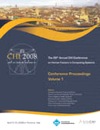CHI 2008: a selection on sustainability
(Papers are linked to their pdf downloads, if available.)
A bright green perspective on sustainable choices [abstract]
Authors: Allison Woodruff (Intel Research), Jay Hasbrouck (Intel) and Sally Augustin (PlaceCoach, Inc.)
Abstract: We present a qualitative study of 35 United States households whose occupants have made significant accommodations to their homes and behaviors in order to be more environmentally responsible. Our goal is to inform the design of future sustainable technologies through an exploration of existing “green” lifestyles. We describe the motivations, practices, and experiences of the participants. The participants had diverse motivations ranging from caring for the Earth to frugal minimalism, and most participants also evidenced a desire to be unique. Most participants actively and consciously managed their homes and their daily practices to optimize their environmental responsibility. Their efforts to be environmentally responsible typically required significant dedication of time, attention, and other resources. As this level of commitment and desire to be unique may not generalize readily to the broader population, we discuss the importance of interactive technologies that influence surrounding infrastructure and circumstances in order to facilitate environmental responsibility.
Breaking the disposable technology paradigm: opportunities for sustainable interaction design for mobile phones [abstract]
Authors: Elaine M. Huang (RWTH Aachen University, Motorola Labs) and Khai N. Truong (University of Toronto)
Abstract: We present a qualitative study of mobile phone ownership, replacement and disposal practices geared towards identifying design opportunities towards sustainable mobile phone interfaces. Our work investigates how people understand the lifespan of their phones, what factors, such as style, service contracts, and functionality, affect how they attribute value to their phones, and their awareness and actions regarding mobile phone sustainability. Our findings reveal the complexity of the actions and decision-making processes involved in phone ownership and replacement. We use these findings to present open areas for sustainable interaction design and generate seed ideas for designs and services to provoke thought and further exploration towards more sustainable mobile phone interfaces and practices.
Sustainable millennials: attitudes towards sustainability and the material effects of interactive technologies [abstract]
Authors: Kristin Hanks, William Odom, David Roedl and Eli Blevis (Indiana University at Bloomington)
Abstract: This paper describes the design and interprets the results of a survey of 435 undergraduate students concerning the attitudes of this mainly millennial population towards sustainability apropos of the material effects of information technologies. This survey follows from earlier work on notions of Sustainable Interaction Design (SID)—that is the perspective that sustainability can and should be a central focus within HCI. In so doing it advances to some degree the empirical resources needed to scaffold an understanding of the theory and principles of SID. The interpretations offered yield key insights about understanding different notions of what it means to be successful in a material sense to this population and specific design principles for creating interactive designs differently such that more sustainable behaviors are palatable to individuals of varying attitudes.
(See also this interview by Luca Chittaro)
Ecovillages, values, and information technology: balancing sustainability with daily life in 21st century America [abstract]
Authors: Lisa Nathan (University of Washington)
Abstract: This project seeks to provide a rich account of the adaptive process that occurs as individuals with explicit value commitments interact with information technology. Specifically, ethnographic methods are being used to investigate the information technology adaptive process as it unfolds in the daily life of two ecovillages, communities made up of individuals striving to balance their use of technology with a lifestyle that is environmentally, socially, and economically sustainable. Anticipated research outcomes include: (1) an analytic description of information technology adaptive process; (2) a categorization of technological functionalities which support or constrain certain values, (3) an empirical extension of Value Sensitive Design, and (4) an analysis of the negotiation around tensions which emerge as a community’s values influence the use of information technology features and, reciprocally, as information technology features influence a community’s values. Most broadly this work contributes to our larger understanding of how the information technology adaptive process influences the human experience.




